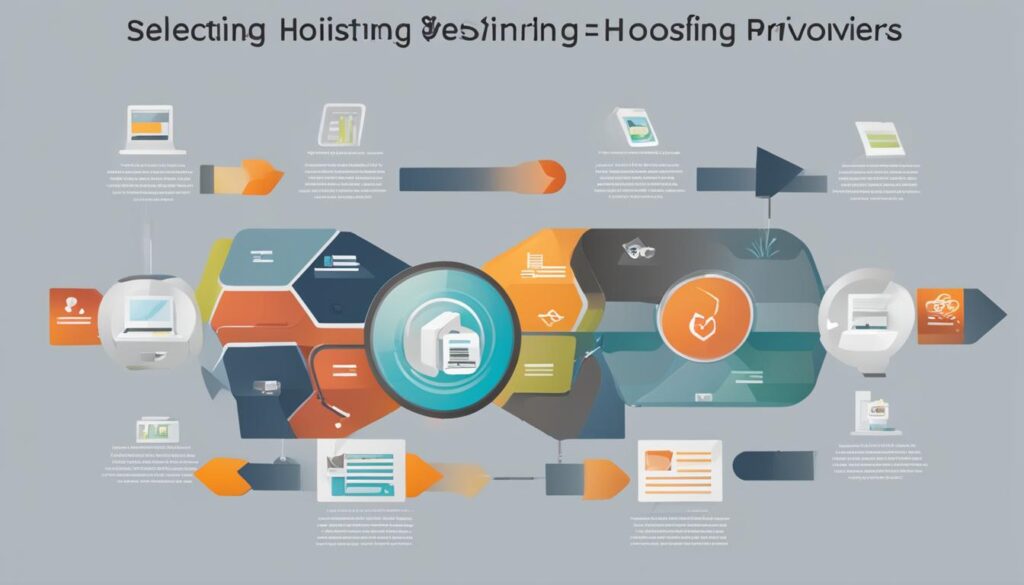Start a Website Business: Beginner’s Guide
In today’s digital age, having a website is crucial for businesses to expand their reach and stay competitive. Building a website can seem daunting, but with the right preparation, it’s possible to create a successful website business. In this beginner’s guide, we will outline the steps to start a website business from scratch, including honing relevant skills, establishing goals, choosing a hosting provider, selecting a domain name, and more.

Key Takeaways:
- Honing relevant skills in web development and coding is crucial for building a successful website business.
- Establish a clear goal for your website to guide design decisions and user experience.
- Choose a reliable hosting provider that aligns with your website’s storage, speed, and functionality needs.
- Select a domain name that reflects your brand and target audience, considering market analysis and keyword research.
- Choose a website layout or template that aligns with your vision and customize it to suit your branding.
Hone and Align Relevant Skills
Before diving into the world of website entrepreneurship and creating a website startup, it’s essential to hone and align your relevant skills. A successful website business requires a strong foundation in web development and coding.
To build a successful website business, you need to have a solid understanding of key programming languages such as JavaScript and HTML/CSS. These languages form the backbone of web development and will empower you to create dynamic and visually appealing websites.
Remember: Your website is the face of your business online, so it’s important to pay attention to every detail. Troubleshooting and debugging skills are crucial to identify and fix any technical issues that may arise during the creation process.
Additionally, having a grasp of search engine optimization (SEO) is essential to improve your website’s visibility in search engine results. This involves optimizing your website’s content, structure, and performance to rank higher and attract organic traffic. Understanding SEO will help you reach a wider audience and position your website for long-term success.
To further enhance your skills, consider learning front and back end web development. Front-end development focuses on creating the visual elements of a website that users interact with, while back-end development involves building the behind-the-scenes functionalities that power the website. Having knowledge in both areas will give you more creative control and enable you to tackle technical challenges with confidence.
Key Skills for Building a Successful Website Business:
| Skills | Description |
|---|---|
| Web Development | Master key programming languages like JavaScript and HTML/CSS to create functional and visually appealing websites. |
| Troubleshooting and Debugging | Develop the ability to identify and fix technical issues to ensure a smooth user experience. |
| Search Engine Optimization (SEO) | Understand how to optimize your website for search engines to increase visibility and attract organic traffic. |
| Front and Back End Development | Gain expertise in both front and back end web development to have more creative control and handle technical challenges. |
By honing and aligning these relevant skills, you’ll be well-equipped to build a successful website business and thrive in the world of website entrepreneurship. Remember, continuous learning and staying up-to-date with industry trends are also essential to stay competitive in the ever-evolving digital landscape.
Establish a Goal
When starting a website business, it’s crucial to establish a clear goal for your website. Determine the purpose of your site, whether it’s to sell products, build brand awareness, or provide information. This will guide your design decisions, layout, and user experience.
Having a detailed and comprehensive goal is essential to shape your website’s interface and overall design. It not only helps you focus your efforts but also ensures your website aligns with your business objectives. Whether you want to launch a profitable website or kickstart a website business, defining your goal will set the foundation for success.
“Setting goals is the first step in turning the invisible into the visible.”
Designing with Purpose
By establishing a goal, you’ll be able to design your website with purpose. Consider the following aspects:
- Determine the primary action you want visitors to take on your website, such as making a purchase or signing up for a newsletter.
- Choose a layout that supports your goal and presents your content in a clear and intuitive manner.
- Use relevant visuals and compelling copy to engage and guide visitors towards your desired outcomes.
- Ensure your website’s navigation is user-friendly, enabling visitors to easily find what they need.
When your website is designed with a specific goal in mind, it becomes a powerful tool to drive conversions, boost engagement, and ultimately contribute to the success of your website business.

Choose a Hosting Provider
Choosing the right hosting provider is a critical step in launching your website business. With so many options available, it’s important to find a provider that meets your specific needs and offers reliable services. Here are some essential tips and considerations to help you make the right choice:
- Assess Your Requirements: Before selecting a hosting provider, assess your website’s needs in terms of storage space, speed, scalability, and functionality. This will ensure that the hosting provider you choose can support your business goals.
- Research Different Providers: Take the time to research and compare different hosting providers. Consider factors such as uptime guarantees, customer support, server locations, and user reviews. Look for providers that have a track record of providing reliable services.
- Check for Complimentary Domain Registration: Look for hosting providers that offer complimentary domain registration or affordable domain services. Having your domain and hosting under the same provider can streamline the setup process and save you time and effort.
- Consider Website Building Tools: If you’re not proficient in coding or web development, consider hosting providers that offer user-friendly website building tools or integrated content management systems (CMS). These tools can simplify the process of designing and managing your website.
- Compare Pricing and Packages: Compare the pricing and packages offered by different hosting providers. Look for transparent pricing structures and ensure that the package you choose aligns with your budget and growth plans. Be wary of providers that offer extremely low prices, as they may compromise on service quality.
- Focus on Performance and Security: Opt for hosting providers that prioritize performance and security. Look for features such as regular backups, SSL certificates, secure server environments, and robust security measures to protect your website and customer data.
- Consider Scalability: As your website business grows, you may need to scale up your hosting resources. Choose a hosting provider that offers scalability options, such as the ability to upgrade your hosting plan or add additional resources as needed.
By following these steps and considering the factors mentioned above, you can select a hosting provider that meets your website business’s requirements and sets you up for success.

The Top Hosting Providers Comparison
| Provider | Uptime | Customer Support | Server Locations | User Reviews | Price Range |
|---|---|---|---|---|---|
| Provider A | 99.9% | 24/7 Live Chat, Email, Phone | Multiple Locations | 4.5/5 | $10-20/month |
| Provider B | 99.8% | 24/7 Live Chat, Email | US, Europe, Asia | 4/5 | $15-25/month |
| Provider C | 99.7% | 24/7 Live Chat, Phone | US | 3.5/5 | $8-15/month |
Choose a Domain Name
Selecting a domain name is a crucial step in starting your website business. A domain name serves as the address of your website on the internet, so it’s important to choose one that aligns with your business name and is memorable for your audience.
When selecting a domain name for your website business, keep the following tips in mind:
- Make it relevant: Include keywords that are relevant to your business to improve search engine optimization (SEO) and boost your website’s visibility in search results.
- Keep it simple: Choose a domain name that is easy to remember and spell. Avoid using numbers, hyphens, or special characters that can confuse your audience.
- Reflect your brand: Your domain name should reflect your brand identity and resonate with your target audience. Consider using your business name or a variation of it.
Conduct market analysis and keyword research to find a domain name that not only reflects your brand but also appeals to your target audience. Remember, your domain name is an essential part of your website’s identity, so choose wisely.

| Pros of choosing the right domain name | Cons of choosing the wrong domain name |
|---|---|
| Improved brand recognition | Difficult for users to remember |
| Enhanced SEO and search engine visibility | Poor search engine rankings |
| Increased credibility and trust | Confusion with competitors’ domain names |
| Easy to share with others | Doesn’t align with your business goals |
Choose a Site Template or Layout
Your website’s layout plays a significant role in the user experience. When starting a website business, it’s crucial to choose a website building platform that offers a variety of templates or themes. These templates make it easier for you to create a visually appealing website without having to design everything from scratch. It’s like having a ready-made blueprint to work with.
Consider your website’s functionality, such as e-commerce elements or appointment scheduling, and select a theme that aligns with your vision. If you’re planning to sell products online, look for templates that have built-in shopping cart features and secure payment gateways. If you’re a service-based business, choose a template that highlights your expertise or showcases your portfolio. Remember, the template you choose should not only look good but also serve the purpose of your website business.
Customize the theme to suit your branding and design preferences. Add your logo, select appropriate color schemes, and incorporate visually appealing graphics. Make sure the layout is user-friendly, with easy navigation and clear sections that guide visitors to their desired information. Remember, your website is a representation of your brand, so it’s important to make it visually appealing, easy to understand, and reflective of your values.
Benefits of Choosing a Site Template or Layout
“Using a site template or layout saves time and effort, as it provides a pre-designed structure for your website. It allows you to focus on content creation and customization, rather than starting from scratch. Templates also ensure consistency in design and user experience across your site.”
By choosing a site template or layout, you can streamline the website creation process and save valuable time and effort. Templates provide a solid foundation that you can build upon, allowing you to focus on adding your unique content and customizing the design. They also ensure consistency in design and user experience across your site, giving visitors a seamless browsing experience.
Remember, while templates provide a starting point, it’s important to make necessary modifications and customizations to make your website stand out. Personalize the template to reflect your brand’s identity and values, ensuring that it resonates with your target audience. Use eye-catching visuals, compelling copy, and intuitive navigation to create an engaging and user-friendly website. A well-chosen site template or layout sets the stage for success in your website business startup.

Build Relevant Pages
One of the key aspects of a successful website business is to have a well-structured website with multiple pages or sections that provide comprehensive information about your business. By planning and organizing your pages effectively, you can create a website that engages users and drives conversions. Here are the steps to build relevant pages for your website business:
Create a Website Structure
Before diving into the actual page creation, it’s important to define the structure of your website. Consider your website’s intended purpose and the user journey you want visitors to follow. This will help you determine the categories and subcategories of your pages and ensure a logical flow of information.
Use a Website Builder
To streamline the page creation process, utilize a user-friendly website builder. This tool allows you to add, remove, and customize pages within your chosen theme. Look for a website builder that offers a variety of templates and layouts to suit your business needs.
Create Pages with Purpose
Each page on your website should serve a specific purpose and provide valuable information to your visitors. Some essential pages to include in your website are:
- Home page: This is the main landing page of your website. It should give a glimpse of your business, showcase your products or services, and provide clear navigation to other pages.
- About us: Use this page to tell the story of your business, highlight your team members, and establish credibility.
- Products/Services: Showcase your offerings with detailed descriptions, images, and pricing information if applicable.
- Contact: Make it easy for visitors to get in touch with you by providing a contact form, email address, and phone number.
- FAQs: Anticipate common questions and provide answers to help visitors find the information they need.
Optimize for Easy Navigation
Ensure your website has a clear and intuitive navigation menu that allows visitors to easily access all the relevant pages. Use descriptive labels for each menu item and consider implementing breadcrumbs or search functionality to enhance user experience.
Add Compelling Content
When building your pages, focus on creating high-quality, engaging content that resonates with your target audience. Use a mix of text, images, and videos to convey your message effectively. Incorporate relevant keywords naturally to improve your website’s search engine visibility.
By following these steps, you can create a website that effectively communicates your brand’s message, engages visitors, and drives the success of your website business.

| Benefits of Building Relevant Pages: | Tips for Effective Page Creation: |
|---|---|
|
|
Establish a Payment System (If Applicable)
If you’re planning to venture into online shopping with your website business, it’s crucial to have a secure and seamless payment system in place. This ensures that your customers have a hassle-free experience when making purchases. A reliable payment system inspires trust and contributes to the success of your website business.
When choosing a payment system, consider one that supports various payment methods and provides a user-friendly interface. It should seamlessly integrate with your storefront layout and enable smooth transactions for your customers. To enhance the user experience, consider implementing features such as sticky header navigation for easy access to purchasing options.

To assist you in selecting the ideal payment system for your website business, below is a comparison table that showcases some popular options:
| Payment System | Features | Pricing |
|---|---|---|
| PayPal | – Supports multiple payment methods – Easy integration – Buyer and seller protection |
Standard: Free Payments Pro: $30/month |
| Stripe | – Supports credit card payments – Customizable checkout – Advanced fraud detection |
2.9% + 30¢ per successful transaction |
| Authorize.Net | – Secure payment gateway – Fraud prevention tools – Recurring billing |
As low as $25/month |
Note: Prices mentioned are indicative and subject to change. Refer to the respective payment system’s pricing page for the most up-to-date information.
Make sure to thoroughly research each payment system, read user reviews, and compare their features and pricing before making a decision. Ultimately, selecting the right payment system is crucial for the smooth operation of your website business and the satisfaction of your customers.
Test and Fine-Tune Your Site
Testing and fine-tuning your website is crucial to ensuring optimal performance and usability. By conducting usability testing and performing technical audits, you can gather valuable insights and make necessary adjustments to create an exceptional user experience. Here are some tips and best practices for testing and optimizing your website:
1. Usability Testing
Conduct usability testing to observe users navigating your site and gather feedback on its design and functionality. This can be done through user interviews, surveys, or remote user testing tools. Pay attention to how users interact with your site, identify any pain points or areas of confusion, and make improvements accordingly.
2. Technical Audits
Perform technical audits to evaluate your website’s performance, SEO factors, and underlying code. This involves analyzing page load times, checking for broken links, assessing mobile responsiveness, and ensuring proper meta tags and structured data. Use tools like Google PageSpeed Insights and Google Search Console to identify areas for improvement.
3. Optimize Site Performance
Optimize your site’s performance by employing techniques like caching, minification of CSS and JavaScript files, and image optimization. Compressing files and reducing server response times can greatly improve page load speeds, enhancing the user experience and increasing the likelihood of visitor retention.
4. Enhance SEO Factors
Pay attention to SEO factors like keyword optimization, meta tags, and URL structure. Conduct keyword research to identify relevant keywords for your business and incorporate them naturally throughout your site’s content. Craft compelling meta titles and descriptions that entice users to click on your site in search engine results pages.
5. Improve User Experience
Continuously monitor user behavior on your site to identify areas where the user experience can be enhanced. Use heatmaps, click tracking, and session recordings to gain insights into user interactions and engagement levels. This data can guide you in improving navigation, layout, and overall site functionality.
6. Ensure Mobile Responsiveness
In today’s mobile-centric world, it’s crucial to optimize your website for mobile devices. Test your site’s responsiveness on different screen sizes and devices to ensure seamless user experience across all platforms. Consider implementing a responsive design or creating a dedicated mobile version of your site.

In conclusion, testing and fine-tuning your website is an ongoing process that requires regular evaluation and optimization. By prioritizing user experience, technical performance, and SEO factors, you can create a website that effectively engages your audience and drives success for your website business.
Promoting Your Site
Once your website is live, it’s crucial to promote it effectively to reach your target audience. Promoting your site enhances its visibility and increases the chances of attracting potential customers. Here are some essential website business tips and steps to start a web business, to help you in promoting your site:
- Utilize Social Media: Maximize the reach of your website by leveraging social media platforms. Create business accounts on popular platforms like Facebook, Instagram, and Twitter. Regularly post engaging content, share updates about your products or services, and interact with your followers to build a loyal community around your brand.
- Harness Google’s Advertising Features: Google offers powerful advertising tools that can help you reach a wider audience. Consider running targeted ads through Google Ads to increase the visibility of your website. Additionally, make sure to list your physical location on Google Maps to attract local customers searching for products or services similar to yours.
- Optimize Your Content: Enhance your website’s visibility in search engine results by implementing effective search engine optimization (SEO) techniques. Conduct keyword research and incorporate relevant keywords into your website content. Focus on creating high-quality, informative content that appeals to both users and search engines.
- Organic Link Building: Build a solid backlink profile by earning links from reputable websites in your industry. Reach out to relevant blogs or websites and propose guest posting opportunities or collaborations. Encourage satisfied customers to leave positive reviews and testimonials, and consider partnerships with influencers or industry experts to expand your reach.
TIP: Remember to monitor your website analytics regularly to track the effectiveness of your promotional efforts. This will help you identify what strategies are working well and refine your promotional tactics accordingly.
Promoting your website is an ongoing process that requires consistent effort and adaptation. By implementing these website business tips and steps to start a web business, you can effectively raise awareness about your site and attract valuable traffic, ultimately driving the success of your website business.
| Promotional Strategy | Benefits |
|---|---|
| Utilizing Social Media |
|
| Harnessing Google’s Advertising Features |
|
| Optimizing Your Content |
|
| Organic Link Building |
|

What is Website Development?
Website development is the art and science of creating and maintaining websites. It involves a range of tasks and processes, including coding, scripting, network configuration, and content management system (CMS) development. Website development is a dynamic field that combines creativity and technical expertise to bring ideas to life on the internet.
In the world of website development, skilled professionals work tirelessly to build user-friendly interfaces, optimize website performance, and ensure seamless navigation for visitors. Whether you’re looking to start a website business or are interested in pursuing a career in web development, understanding the basics of website development is essential.
“Website development involves the technical aspects of building and maintaining a website, such as coding and network configuration. It’s an art form that requires creativity and expertise.”
Creating a website startup requires a solid foundation in website development. By learning the fundamentals, you’ll gain the skills necessary to create functional, visually appealing, and user-friendly websites that meet the needs of your target audience.
Running a successful website business requires not only technical know-how but also an understanding of user experience (UX) design, search engine optimization (SEO), and the latest web development trends. By staying up-to-date with industry advancements, you can ensure that your website business remains competitive in the ever-evolving online landscape.
Why Website Development Matters for Creating a Website Startup
When starting a website business, having a strong foundation in website development is crucial for several reasons:
- Flexibility: With website development skills, you have the flexibility to customize and tailor your website to meet the unique needs of your business.
- Cost-Effective: Building and maintaining your website in-house can save you significant costs compared to hiring external web developers.
- Control: Understanding website development empowers you to have full control over your website’s design, functionality, and performance.
- Quick Troubleshooting: When issues arise on your website, having website development skills allows you to troubleshoot and resolve problems efficiently.
By acquiring website development skills and knowledge, you’ll be equipped with the tools necessary to turn your website business ideas into reality. With creativity, technical expertise, and a passion for web development, you can create websites that captivate audiences and drive business success.
Skills Needed for Website Development
Becoming proficient in website development requires a combination of technical skills and creative problem-solving abilities. Here are some essential skills needed for website development:
- HTML/CSS: The foundation of web development, HTML (Hypertext Markup Language) and CSS (Cascading Style Sheets) are the languages used to build the structure and design of websites.
- JavaScript: JavaScript brings interactivity and dynamic features to websites, making them more engaging for users.
- Backend Development: Backend development involves working with server-side programming languages, databases, and frameworks to handle data and perform complex tasks.
- Frontend Development: Frontend development focuses on creating the client-side interface of a website, including design, layout, and user experience.
- Search Engine Optimization: Understanding SEO principles and techniques helps optimize websites for better visibility and rankings on search engines.
- Version Control: Version control systems, such as Git, enable developers to track changes to code and collaborate effectively with others.
Developing these skills will empower you to take control of your website development process and create websites that stand out in the competitive digital landscape.

Types of Web Development
When it comes to website development, there are various types that cater to different aspects of web creation. Understanding these types can help you determine which areas to focus on and enhance your expertise in specific domains.
Front-end development is responsible for the visual elements that users see and interact with on a website. It involves coding languages like HTML, CSS, and JavaScript to create the user interface and optimize the user experience.
Back-end development focuses on the behind-the-scenes functionality of a website. It includes server-side scripting, database management, and integration of various systems to ensure smooth operation and data management.
Full stack development combines both front-end and back-end development, making it a comprehensive approach to website creation. Full stack developers have expertise in both areas and can handle the entire development process from start to finish.
Other types of web development include desktop development, which involves creating applications specifically for desktop platforms; mobile development, which focuses on optimizing websites for mobile devices and creating mobile applications; game development, which specializes in creating interactive and engaging web-based games; embedded development, which deals with creating web applications for embedded systems; and security development, which focuses on ensuring the security and integrity of websites and web applications.
By understanding the various types of web development, you can choose the areas that align with your interests and goals. This knowledge will help you create a website startup that excels in the specific domains you choose to specialize in.
FAQ
How do I start a website business?
To start a website business, you need to hone relevant skills in web development and coding, establish clear goals for your site, choose a hosting provider, select a domain name, and build relevant pages. Follow our beginner’s guide for detailed steps.
What skills do I need to start a website business?
To start a website business, you need skills in web development and coding, including languages like JavaScript and HTML/CSS, troubleshooting and debugging, understanding of SEO, and familiarity with front and back end web development.
How do I choose a hosting provider for my website business?
When choosing a hosting provider, look for reliable services, complimentary domain registration, and website building tools. Consider your specific needs for storage space, speed, and functionality. Research different providers and compare their offerings to find the best fit for your website business.
What should I consider when selecting a domain name?
When selecting a domain name, ensure it aligns with your business name, is easy to remember and spell, and includes keywords relevant to your business. Conduct market analysis and keyword research to find a domain name that reflects your brand and target audience.
How do I choose a site template or layout for my website business?
Choose a website building platform that offers a variety of templates or themes. Consider your website’s functionality, such as e-commerce elements or appointment scheduling, and select a theme that aligns with your vision. Customize the theme to suit your branding and design preferences.
How do I build relevant pages for my website business?
Plan and structure your pages based on your website’s intended purpose and user journey. Use a website builder to add, remove, and customize pages within your chosen theme. Create pages that showcase your products, services, and company information in a logical and easily navigable way.
How do I establish a payment system for my website business?
If your website business involves online shopping, choose a storefront layout that showcases your products or services and supports various payment methods. Ensure a smooth user experience with features like sticky header navigation. A convenient and trustworthy payment system can build customer loyalty and contribute to the success of your website business.
How do I test and fine-tune my website?
Conduct usability testing to observe users navigating your site and gather feedback to improve its design and functionality. Perform technical audits to evaluate site performance metrics, SEO factors, and underlying code. Make necessary adjustments to optimize your site for the best user experience and search engine visibility.
How do I promote my website to my target audience?
Utilize social media accounts to raise awareness and engage with potential customers. Consider Google’s advertising and business features to reach a wider audience through targeted ads and listing your physical location on Google Maps. Make use of organic linking, content optimization, and other SEO techniques to improve your site’s visibility and ranking in search results.
What is website development?
Website development encompasses the tasks and processes involved in creating and maintaining a website. It includes coding, scripting, network configuration, and CMS development. Web development is an art form that brings ideas to life, requiring creativity and technical expertise.
What are the types of web development?
There are various types of web development, including front-end development, back-end development, full stack development, desktop development, mobile development, game development, embedded development, and security development. Each type focuses on different aspects of web creation and requires specialized skills.






